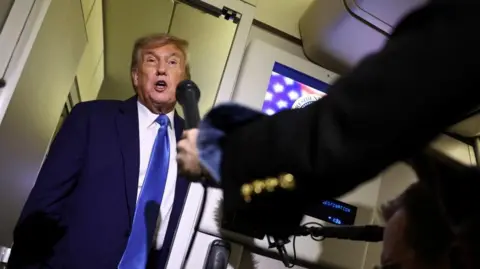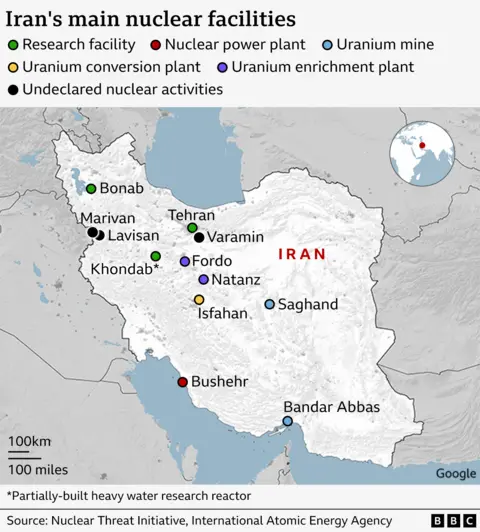Trump weighs joining Iran strikes after calling for 'unconditional surrender'
 Reuters
ReutersUS President Donald Trump is considering whether to join Israel's strikes on Iran's nuclear sites, as the conflict continues for a sixth day and angry rhetoric ramps up between all sides.
American strikes could involve using superior weaponry to hit an underground nuclear site at Fordo, according to five sources who spoke to the BBC's US partner CBS News.
The president met with his national security team on Tuesday to discuss next steps.
Israel and Iran have exchanged deadly strikes since Friday. Analysts say Trump's comments suggests a willingness to join the Israelis, despite his earlier call for de-escalation and his vocal support for a diplomatic solution to limit Iran's nuclear research.
He has shown increasing frustration over a perceived lack of progress to secure a new deal that would be aimed at preventing Iran from building a nuclear weapon. Trump pulled out of a previous accord with Iran during his first term.
In a social media post on Tuesday, Trump threatened Iranian Supreme Leader Ali Khamenei and said the US knew where he was.
"He is an easy target, but is safe there," Trump wrote. "We are not going to take him out (kill!), at least not for now. But we don't want missiles shot at civilians, or American soldiers. Our patience is wearing thin."
Another post from Trump simply read: "UNCONDITIONAL SURRENDER!"
On Wednesday, Iran's supreme leader responded to the comments directly and said the country would never surrender.
"Any form of US military intervention will undoubtedly be met with irreparable harm," Khamenei said.
"Wise people who know Iran, its people, and its history never speak to this nation in the language of threats, because Iranians are not those who surrender," he added.
The US has insisted that Iran must scrap its uranium enrichment to prevent the country developing nuclear weapons - although Iran insists its nuclear activities are entirely peaceful.
Trump pulled out of a previous nuclear agreement between Iran and five other world powers in 2018. After returning to office, he dispatched negotiators to try to reach a new agreement with the Middle Eastern nation, without a breakthrough.
Trump appears to have cooled on traditional diplomacy in recent days. On Tuesday, while travelling back to the US from a G7 summit in Canada, he said he was "not too much in the mood to negotiate with Iran".
Trump's frustrated language implied that he was crossing a threshold that would be "very difficult to row back from", Professor Amnon Aran, an Israeli foreign policy expert, told BBC Radio 5 Live.
"We're definitely the closest we have been" to a US entry in the conflict since it began, he added.
Other pundits suggested Trump could be forced into action. A former Israeli ambassador to the US, Michael Oren, speculated that the president would feel he had little choice but to intervene if Iran attacked a US ship or base.
However, such an attack might also be an Iranian tactic to prompt Trump to pressurise Israel into negotiating an end to the fighting, Mr Oren told BBC Radio 4's Today programme.
Trump himself told reporters on his return from the G7 that his goal was "an end, a real end, not a ceasefire". His comments came just hours after he joined other leaders in the Western alliance in issuing a statement that called for de-escalation in the Middle East.
Trump left the summit early to respond to the crisis from Washington, before a series of statements left observers unclear which way he might choose to go.
A message urging Iranians to evacuate Tehran similarly caused a flurry of speculation, as well as anxiety in the Iranian capital itself.
US Defence Secretary Pete Hegseth earlier announced the "deployment of additional capabilities" to the Middle East to enhance the Pentagon's "defensive posture", despite US officials' denial at the time that they were joining the military action.
At least 30 US military planes have been moved from bases in America to Europe over the past three days, flight tracking data reviewed by BBC Verify has shown.
It was unclear whether the US movements were directly connected to the Israel-Iran conflict, but one expert said the tanker aircraft flights were "highly unusual".
Another expert said that the movements could be part of a broader policy of "strategic ambiguity" aimed at influencing Iran to make concessions.
Signing up to Israeli military action does not have full agreement from Trump's closest advisers, CBS reported. But the dissenting voices have not gone public.
There are also a wide range of views within Trump's supporter base. The Republican ran for re-election on the basis that he would disentangle America from conflicts overseas, and he has previously criticised US intervention in the Middle East.
On the question of Iran's capacity to build a nuclear weapon, there appears to be a differing assessment by Trump and his director of national intelligence, Tulsi Gabbard.
Asked on Tuesday about Gabbard's earlier suggestion that Iran was not working on a nuclear warhead, Trump replied: "I don't care what she said. I think they were very close to having one."
Advisers to both Trump and Gabbard later denied the pair disagreed on the issue.
There were no deaths overnight from Tuesday into Wednesday in Israel from Iranian missile attacks.
And more than 50 Israeli fighter jets conducted operations in Iran overnight, with strikes on an Iranian centrifuge facility, a missile production facility near Tehran, and a university linked to Iran's Revolutionary Guards.
Israel is America's main partner in the Middle East, and Trump has continued to stand by Israeli Prime Minister Benjamin Netanyahu amid widespread international condemnation of Israel's military actions in Gaza following the Hamas attacks on Israel on 7 October 2023.

